
PERJURY AND PARDON, VOLUME I
THE SEMINARS OF JACQUES DERRIDA
Edited by Geoffrey Bennington and Peggy Kamuf
Perjury and Pardon
VOLUME I
Jacques Derrida
Edited by Ginette Michaud and Nicholas Cotton
Translated by David Wills
The University of Chicago Press
CHICAGO AND LONDON
The University of Chicago Press, Chicago 60637
The University of Chicago Press, Ltd., London
2022 by The University of Chicago
All rights reserved. No part of this book may be used or reproduced in any manner whatsoever without written permission, except in the case of brief quotations in critical articles and reviews. For more information, contact the University of Chicago Press, 1427 E. 60th St., Chicago, IL 60637.
Published 2022
Printed in the United States of America
31 30 29 28 27 26 25 24 23 22 1 2 3 4 5
ISBN -13: 978-0-226-81917-4 (cloth)
ISBN -13: 978-0-226-81918-1 (e-book)
DOI : https://doi.org/10.7208/chicago/9780226819181.001.0001
Originally published in French as Le parjure et le pardon. Volume I. Sminaire (19971998) ditions du Seuil, 2019. Portions of were published in French in Pardonner. Limpardonnable et limprescriptible ditions Galile, 2012, pages 972.

www.centrenationaldulivre.fr
Library of Congress Cataloging-in-Publication Data
Names: Derrida, Jacques, author. | Michaud, Ginette, 1955, editor. | Cotton, Nicholas, editor. | Wills, David, 1953, translator. | Derrida, Jacques. Works. Selections. English. 2009.
Title: Perjury and pardon / Jacques Derrida ; edited by Ginette Michaud and Nicholas Cotton ; translated by David Wills.
Other titles: Parjure et le pardon. English (Wills)
Description: Chicago ; London : The University of Chicago Press, 2022 | Series: The seminars of Jacques Derrida | Includes bibliographical references and index. |
Identifiers: LCCN 2022003727 | ISBN 9780226819174 (volume 1, cloth) | ISBN 9780226819181 (volume 1, ebook)
Subjects: LCSH : ForgivenessPhilosophy. | Forgiveness in literature.
Classification: LCC BF 637. F 67 D 4713 2022 | DDC 155.9/2dc23/eng/20220207
lc record available at https://lccn.loc.gov/2022003727
 This paper meets the requirements of ANSI/NISO Z 39.48-1992 (Permanence of Paper).
This paper meets the requirements of ANSI/NISO Z 39.48-1992 (Permanence of Paper).
CONTENTS
When the decision was made to edit and publish Jacques Derridas teaching lectures, there was little question that they would and should be translated into English. From early in his career, in 1968, and annually thereafter until 2003, Derrida regularly taught at US universities. It was his custom to repeat for his American audience the lectures delivered to his students in France the same year. Teaching first at Johns Hopkins and then at Yale, he read the lectures in French as they had been written. But from 1987, when he began teaching at the University of California, Irvine, Derrida undertook to lecture in English, improvising on-the-spot translations of his lectures. Recognizing that the greater part of his audience outside of France depended on translation proved easier, however, than providing a satisfying ad libitum English version of his own elegant, complex, and idiomatic writing. In the circumstance, to his evident joy in teaching was often added a measure of suffering and regret for all that remained behind in the French original. It is to the memory of Derrida the teacher as well as to all his students past and still to come that we offer these English translations of The Seminars of Jacques Derrida.
The volumes in this series are translations of the original French editions published by ditions du Seuil, Paris, in the collection Bibliothque Derrida under the direction of Katie Chenoweth. In each case they will follow shortly after the publication of the corresponding French volume. The scope of the project, and the basic editorial principles followed in establishing the text, are outlined in the General Introduction to the French Edition, translated here. Editorial issues and decisions relating more specifically to this volume are addressed in an Editorial Note. Editors footnotes and other editorial interventions are mostly translated without modification, but not in the case of footnoted citations of quoted material, which refer to extant English translations of the source as necessary. Additional translators notes have been kept to a minimum. To facilitate scholarly reference, the page numbers of the French edition are printed in the margin on the line at which the new page begins.
Translating Derrida is a notoriously difficult enterprise, and while the translator of each volume assumes full responsibility for the integrity of the translation, as series editors we have also reviewed the translations and sought to ensure a standard of accuracy and consistency across the volumes. Toward this end, in the first phase of work on the series, we have called upon the advice of other experienced translators of Derridas work into English and wish to thank them here: Pascale-Anne Brault, Michael Naas, Elizabeth Rottenberg, and David Wills, as well as all the other participants in the Derrida Seminars Translation Project workshops.
Geoffrey Bennington
Peggy Kamuf
MARCH 2019
Between 1960 and 2003, Jacques Derrida wrote some fourteen thousand printed pages for the courses and seminars he gave in Paris, first at the Sorbonne (196064), then at the cole normale suprieure, rue dUlm (196484), and then, for the last twenty years of his life, at the cole des hautes tudes en sciences sociales (EHESS, 19842003). The series The Seminars of Jacques Derrida, in the collection Bibliothque Derrida, will make available the seminars that Derrida gave at EHESS, four of which have already appeared. This corresponds to the period in Derridas teaching career when he had the freedom to choose the topics he was going to treat, most often over two or even three years, in seminars that were themselves organized into the following thematic series: Philosophical Nationality and Nationalism (198488), Politics of Friendship (198891), followed by the long sequence of Questions of Responsibility (19912003), focusing successively on the secret (199192), testimony (199295), hostility and hospitality (199597), perjury and pardon (199799), the death penalty (19992001), and, finally, questions of sovereignty and animality under the title The Beast and the Sovereign (20013). We will here follow the logic previously established for the final seminars of Jacques Derrida, namely, publishing in reverse chronological order all the seminars given at EHESS, all the while respecting the internal chronology of each thematic series. In accordance with that plan Perjury and Pardon I (199798) will be followed by Perjury and Pardon II (199899), and so on up through the fourth volume of the first series, titled Philosophical Nationality and Nationalism.
We have tried in our editorial work to remain as faithful as possible to the text as Jacques Derrida wrote it and we present it here with as few editorial interventions as possible. With very few exceptions (for example, improvised sessions), Derrida would prepare for each class session not notes but a continuous written text, sometimes punctuated by references to the texts he was quoting, didascalia (e.g., comment) indicating a time for improvisation, and marginal or interlineal annotations. When we have been able to locate tape recordings of the seminars, we have also indicated in footnotes the oral comments that Derrida added to his text in the course of a seminar session. It is likely that if Derrida had himself published his seminars during his lifetime he would have reworked them. This practice of reworking was in fact rather common with Derrida, who frequently drew from the vast wealth of material of his courses for lectures and texts he intended for publication. This explains the fact that we sometimes find a partial reworking or adaptation of a seminar in an already published work, highlighting even further the dynamic and coherence that characterized Derridas teaching, a laboratory where ideas were tested and then frequently developed elsewhere in a more or less modified form. That being said, most of the seminars that will appear in the Bibliothque Derrida have not been previously published in any form: their publication can only greatly enrich the corpus of Derridas thought by making available one of its essential resources.
Next page



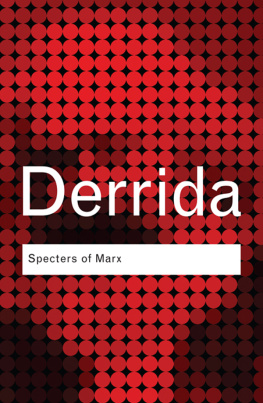

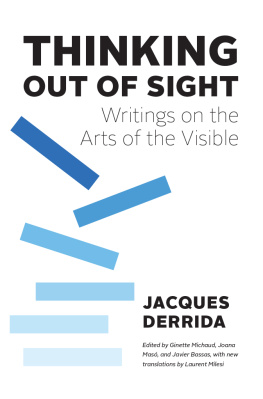




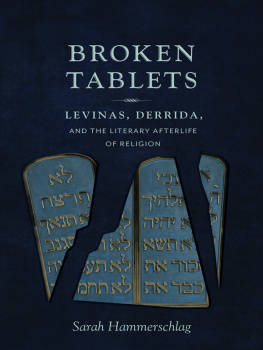
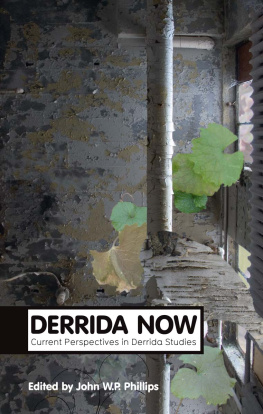
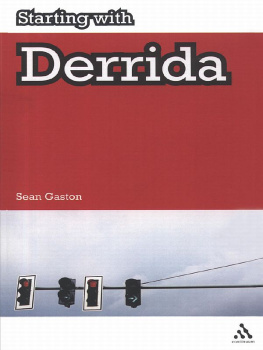
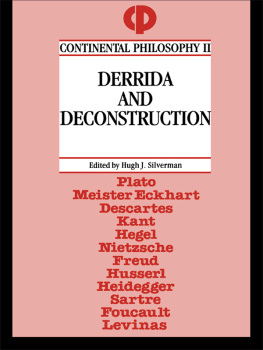





 This paper meets the requirements of ANSI/NISO Z 39.48-1992 (Permanence of Paper).
This paper meets the requirements of ANSI/NISO Z 39.48-1992 (Permanence of Paper).